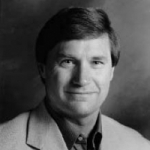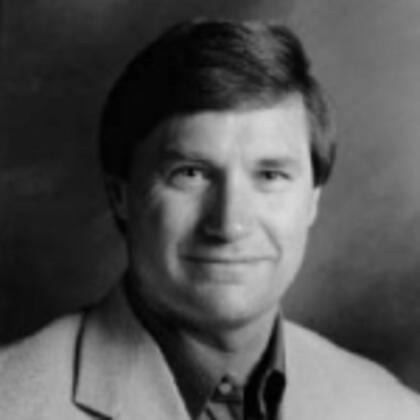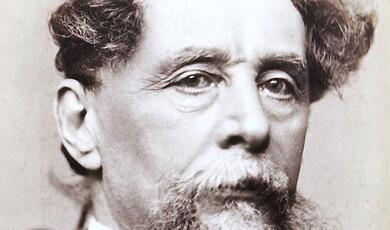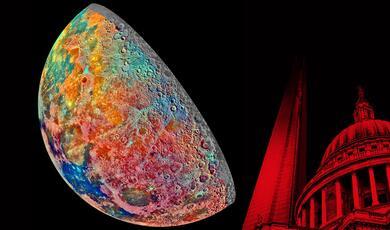Book Launch: The Infinite Book
Share
- Details
- Transcript
- Audio
- Downloads
- Extra Reading
A short guide to the boundless, timeless and endless
by John D Barrow FRS
Gresham Professor of Astronomy
THE INFINITE BOOK
Everything you might want to know about infinity by one of Britain’s most distinguished scientists, and most successful writers of popular science. The Infinite Book explores all the questions, imponderable and otherwise, that the idea of infinity contains, through a history of the great minds occupied with it. Here, in a delightful mix of the serious and playful, we encounter the great thinkers of history from Aristotle to Zeno (with a little Woody Allen and Basil Fawlty thrown in for good measure) grappling with the infinite. John Barrow’s excursions into literature, philosophy and history give this book the broadest possible appeal.
John D Barrow is Research Professor of Mathematical Sciences in the Department of Applied Mathematics and Theoretical Physics at the University of Cambridge, and is the current Gresham Professor of Astronomy. He is the author of several best-selling books, including Theories of Everything, Impossibility and The Book of Nothing. A play based on John Barrow’s ideas about infinity has recently been staged to great critical acclaim in Italy.
‘Barrow does for physics what Robert Harris’ Fatherland did for history.’ The Guardian
‘His appeal lies in a winning way with historical anecdote and apt quotation and a forceful eloquence, when it comes to the most mind-boggling thoughts, which irresistibly sweep you along.’ Sunday Telegraph
The Infinite Book was published by Jonathan Cape on 27th January 2005 at £17.99
Download Transcript
BOOK LAUNCH - INFINITY AND BEYOND
Professor John D Barrow FRS
The topic of infinity is rather an unlikely one. If you were to pick almost any other subject that forms part of the realms of advanced mathematics, like cohemology theory or complex manifolds, the average person on the street would not know one iota about the subject if you stopped them and asked them about it, but infinity is rather unusual. It’s an esoteric and rather abstract subject, but almost everyone that you stopped on the right street in London would feel somewhat at home with the topic, even if it was just mind-boggling, even if their ideas about it were solely informed by religious notions of everything around them – like the mystic said to the hamburger salesman “Make me one with everything”.
A similar type of intuition perhaps explains why if you look back thousands of years to the oldest mythological records we have about human thinking, you see that when language began, most advanced cultures around the ancient world had a word for the concept which we call infinity, and one can detect various types of intuitions which might have led to them having that type of idea. At first, you might think that infinity or the unboundedness of the universe or everything around us a rather deep and unusual idea. Perhaps so, but it’s rather like growing old; it’s not so bad when you think about the alternative. If the world has an edge, this is a much more problematic idea. As the Greeks imagined, what would happen if there was an edge to the world, if you stepped up to the edge with your sphere and launched it from the edge, what would happen? Either there’s something beyond the edge which stops the spear going any further, or there isn’t an edge. So the idea of there being a boundary of the world, of it not being unbounded, is an equally and perhaps even more problematic idea. And if you’re in the habit of chopping things up, smaller and smaller and smaller, it’s rather hard to imagine that there should be an end to that process. So again, you see the idea that there isn’t a never-ending process is a more difficult one to get your head around.
In the Far East, many ancient cultures were completely at home with the idea that there was neither a beginning nor an end to the world. The way they accommodated it, more often, was simply by the process of cyclic change. If you’re an agriculturalist, then the coming and going of the seasons, the coming and going of the months and the years, impresses upon on the cyclic nature of the world around you. It’s eminently reasonable to imagine that the world itself, in its entirety, is a cyclic, never-ending infinite process. But if you’re just a sunbather, or even an astronomer, your intuition might well just come from looking at the apparently boundless sky above you. We know that astronomy mutated into astrology in forms of speculations and religious notions of all sorts of ancient cultures. Being more prosaic, if you look at people’s decorative activities, their wallpaper if you like, particularly in the Islamic world, you find there’s another type of never-ending intuition, and it’s about tessellation and tiling - the idea here that you can take a regular 5-sided figure, and just repeat that for ever, and you could tile an infinite plane by this periodic, repeating process, and so you begin to build up an intuition about a never-ending repetitious process.
Well, infinity’s all right when you don’t think too much about it. Once cultures came along that started to think about things more deeply, particularly the Greeks, then you started to run into problems and difficulties. Aristotle is the most influential of those ancient thinkers about infinity, and a great distinction that he made, and which hung around for several thousand years almost afterwards, was the distinction between what was called potential and actual infinities. Potential infinity is one that you never actually get to. We know lots of them: if you count the ordinary numbers – 1, 2, 3, 4, 5, and so on, forever – that’s a potential infinity. You never reach the last number; there is no last number to reach. If we live in a universe which is infinite in size, then that also is a potential infinity. You can’t get there, you can’t touch it, it can’t come and punch you on the nose. Aristotle and thinkers after him were quite content with infinities of that sort. What they didn’t like were so-called “actual infinities”, so these are infinities that bite you, as it were: an infinite temperature, an infinite density, an infinite number of things in a bag in front of you. This was something that Aristotle was not willing to admit into his description of the world, so nothing could be actually infinitely large, actually infinitely small, or infinitely numerous.
This was tied up with all sorts of other interesting beliefs about the nature of the world, that the world itself, the universe if you like, must be finite. One of the reasons, if you’re Aristotle, you want the world to be finite is because you want there to be a centre, and you want us to be located at the centre. Now that’s possible if the world is finite, but it’s not possible if the world is infinite, and 400 years ago, people were burnt at the stake for thinking otherwise. Bruno, for example, 400 years ago, argued that the world was infinite, and Aristotle’s claim that the world was finite and therefore had to have a centre was incorrect.
There is a simple beautiful graphic by Esher which illustrates the point. Imagine that there’s a never-ending latticework of great metallic girders going on forever. You could locate yourself on any one of the infinite number of crossovers in this lattice universe, and everywhere you looked around you, in all three directions, you would see on the average exactly the same structure. So in this infinite lattice universe, there is no centre, there is no edge, there is no boundary; it’s infinite in size; it’s infinite in extent. If you heated it up, so all the metallic struts expanded due to the heating, this would be an expanding universe, and wherever you were located, you would see the whole of that universe expanding as if you were at the centre. So an infinite universe has no centre, it’s rather awkward if you’re tediologically inclined.
Although infinity is a rather esoteric idea, it has a lot in common with more familiar things, like buses, and that’s because infinity, like buses, always come in threes. The three types of infinity that it’s useful to distinguish, and people have ever since Aristotle, are: the mathematical sort, the 1, 2, 3, 4, 5, and so forth for ever, and something else we’ll see in the moment; the physical infinity, so this would be the possibility that something could happen in the universe here and now which had, for example, an infinity density, an infinite brightness, an infinite temperature, so something which we could measure in an experiment would become infinite (that was the sort of thing that Aristotle would not permit to occur); and the third is the more nebulous idea, perhaps no less real, that our correspondent in the street that we mentioned at the beginning felt very happy with, this sort of transcendental or religious idea that there is an infinite everything, perhaps associated with God. These three types of infinity are rather different in practice, and it’s important not to mix them up.
The physical infinite is in some ways the most tantalising of all, and this idea that you could have something that would happen in the universe that would produce an infinite effect in a finite time is rather unusual. I’ve got a demonstration here of something that almost does that, and this little disc, which is just a glorified version of a penny, and it’s just spinning round. The friction of the air and of the beautifully silvered surface at the bottom is gradually damping out the energy of this heavy penny. If we were in a perfect world, where there was no friction and no air resistance, this little oscillating object would perform an infinite number of oscillations in a finite time. Now it doesn’t do that, but as you’ll see in a moment, it performs an awful lot of oscillations rather dramatically. In a moment, it will start to speed up and accelerate, and you get an impression of what an infinite process is almost like. As the frequency is rising, so the sound frequency is also rising. If you do this with a penny, it’s damped out long ago. There’s no electric motor in this, remember.
Well, let’s have a look at some of the aspects of mathematical infinites that are rather peculiar. The first thing to remember is that infinity is not a big number, contrary to rumour. The point of that seemingly bizarre statement is that infinity doesn’t behave like a very large number. There’s a tendency for people to think that it is just like a very large number, just a bit bigger than any finite number you care to think about, but what I want to try and persuade you of is it doesn’t behave like any finite number, no matter how big it is.
The first person historically who seems to have really dabbled with the peculiar paradoxes of infinity and what you can do with it was someone called Albert of Saxony. The history books tend to call him Albertutius or Little Albert, simply to distinguish him from Albert Magnus or Albert the Great, who was a famous figure in theological, philosophical history, just a little earlier than him. Albert was a magician, theologian and administrator in Saxony and Switzerland, a substantial figure. What he pointed out was if you had a never-ending log of wood, it was possible to build an entire infinite universe out of just this one log of wood. It is rather strange. The idea is that you have something rather like a cylinder, a sort of piece of four by four that goes on for ever, and then you chop it up into little bricks, and you re-assemble the bricks. First of all you have one brick, and then you take another 26 bricks, put them round the outside, and you’ve got a three by three by three cube. You now take another collection of these bricks, so that you make the total number up to 125, and you’ve got a five by five by five brick, and you can keep on chopping off a number of individual bricks from your long cylinder, re-assemble them to make a cube which gets larger and larger and larger. If you use an infinite number of these little bricks, you can fill the whole of infinite space. This was regarded as a great paradox, in which you can take a little bit of a three-dimensional universe, and build an entire three-dimensional universe out of it. So if you had a strip which was a finite length, this would be impossible, so this is what I mean by saying infinite is not like any finite number.
The next person who dwelt on this sort of paradox came several hundred years later. You have to wait till Galileo, in one of his dialogues, presents a little paradox which convinces him that you mustn’t think too much about infinity, that it doesn’t make sense and you’ve got to keep away from it. The spirit of his suggestion, or his little paradox, is as follows. Suppose you take all the ordinary numbers – 1, 2, 3, 4, 5, 6, 7 - all the way up as far as you like, and then you take some other collection of numbers which on the face of it seem to be fewer, so you take all the even numbers. If you asked anyone on the street, they’d say there’s only half as many. But Galileo said you might think that, but when you look at the list, suppose you took a cord and joined the cord from one to two, from two to four, from 3 to 6, from 4 to 8, and so on for ever, then every number in the even list at the bottom is linked to one and only one number in the top list, so surely there’s exactly the same number of numbers. So the trademark of infinity is that somehow it contains itself as a sub-set, the whole of itself.
Well, mathematicians didn’t really pick up on this idea. It was regarded as a paradox for hundreds of years after that observation. Even Isaac Newton, when he thought about the idea of infinities, one of the few cases where you discover him getting it completely wrong, so in correspondence with Bentley, he dwelt a bit on infinity, he decided that because his friends could write down infinite series, that in some sense he would have argued that there were half as many even numbers as ordinary numbers. So he was not correct on that.
A curious discovery is that another Newton in some ways actually got it right, and this is John Newton, the hymn writer. If you look at one of the verses in his hymn “Amazing Grace”, there’s a rather curious verse: “When we’ve been there ten thousand years, we’ve no less days to sing God’s praise than when we’d first begun.” Unfortunately I learnt after researching this more carefully that this famous stanza in this hymn was not written by Newton. It was an anonymous addition some years after, but it captures exactly the idea of an infinite sequence, that after you’ve spent some period of time on an infinite sequence, there’s still just as much remaining, so the whole sequence is a sub-set of itself.
There is another nice example of this sort, which is more graphical, which was cooked up in the early 20th century, and it’s the idea of an infinite hotel. If you’re interested in infinite hotels, there’s a whole chapter of my book which tells you lots about the management of an infinite hotel and all the strange paradoxes that arise. As you probably know, if you go to an ordinary hotel, and ordinary finite hotel, and it’s full, then you can’t get a room, that’s it, but if you go to an infinite hotel, even if it’s full, you can always get a room. So suppose all the rooms are full and you arrive, then all the person at the desk has to do is to move the guest in room 1 to room 2, the guest in 2 to 3, in 3 to 4, 4 to 5, and so on, and room 1 is now vacant, and everybody else has a room. Even if you turn up with an infinite tour, an infinite number of guests can always be fitted in to the hotel, even if it’s full. How do you do it? Well, you follow Galileo’s little lesson. The person in room 1 you move to 2, the person in 2 to 4, 3 to 6, 4 to 8, and so on, and all the odd numbered rooms are now empty. There are an infinite number of them and all the guests can be accommodated. Room service gets rather slow, particularly in the high numbered rooms!
This is an interesting little example I think that was originally conceived by David Hilbert, a famous mathematician of the early twentieth century, and as you might imagine, he was a rather strange man! There’s a curious collection of stories about Hilbert. The most peculiar is that on one occasion he’d given one of his research students a problem to solve, and the student became extremely neurotic about this problem and he couldn’t solve it, and he ended up committing suicide. The family invited Hilbert to make a sort of graveside eulogy and statement about the student, which he did in his very serious minded, rather other-worldly way, and saying the death was most unfortunate because it really wasn’t a very difficult problem at all!
The whole process of understanding infinity was really resolved by George Cantor, a German mathematician, in the nineteenth century. What he did was to take this paradoxical situation of infinities being things where a sub-set of the thing is the same as the thing itself, and used that as the definition of an infinite set. So an infinite collection of things is one that can be put into a one-to-one correspondence with a sub-set, with a part of itself. So just like the ordinary numbers, they could be put in that one-to-one correspondence with the even numbers which was a part of themselves. You can’t do that if the set is finite. This was a dramatic leap forward in understanding, because it enabled Cantor not only to make sense of all those so-called countable infinities, like the even numbers, the odd numbers. He was able to show that all the fractions, like three over four, five over six, and so on, these are countable in the same way. You have to be a little clever how you count them, you have to count them in the right way, but they are an infinity of the same size as all the ordinary numbers. But his dramatic discovery was that there are bigger infinities, infinities which are infinitely bigger, because they can’t be put into this one-to-one correspondence with the ordinary numbers. The great example of this was the collection of all the decimals, and a beautiful argument that Cantor introduced. It’s worth saying, people think that what mathematicians do is that they just sit around proving theorems, and their friends think well of them if they prove a new theorem, but what mathematicians are really interested in is new types of argument, because new types of argument allow you to prove all sorts of things in different situations. Cantor introduced a new type of argument. He first of all said well let’s suppose we take a huge list of every possible never-ending decimal, and we imagine that we can count those in the same way that we can count the even numbers. He said let’s assume that in this list we have every possible decimal, and then he produced a contradiction. Suppose we create a new number, have number two in the first decimal place, seven in the second, one in the third, zero in the fourth, and three in the next, but just change those numbers by one, so it’s point three, eight, two, one, four, and so on for ever, then this number is guaranteed to differ in some decimal place to every number on the list, and so it cannot be in the list, and therefore we have illogical contradiction to our original assumption that we could enumerate in this list every never-ending decimal. What he had demonstrated by that little trick was that there was an infinite collection of things which could not be counted – it was a higher order infinity. And then he went a little bit further, to show that in fact even that infinity is not the largest that there is. If you give any infinite collection, from it you can keep on making collections which are infinitely larger, which cannot be put in one-to-one correspondence with all the ones that you’ve already made.
The recipe is fairly simply. Take an example with a finite collection, Tom, Dick and Harry, three people, what you do is to form all the little sub-sets, the sub-collections, that you can make from those three people. You can have a collection which has got nobody, that mathematicians like to call the empty set, you can have the three that just has Tom on his own, Dick and Harry on their own, then you can have them in pairs, Tom and Dick, Dick and Harry, Tom and Harry, and then you can have all three together, and you notice there are eight of these sub-collections, two to the power three. In general, if you have any infinite collection of things, rather than a finite one, if you enumerate all the possible sub-sets, all the sub-collections that there can be, this can never be put in a one-to-one correspondence with the set itself.
Cantor produced an outrageous sort of staircase to heaven, if you like. There was the simple countable infinity at the bottom, and then up you went for ever and ever. There is no largest infinity. If you’re given one, you can always make a bigger one. Many mathematicians in Germany were rather horrified by this whole idea; they didn’t regard this business as being part of mathematics, the idea that you could have a collection of things that were infinite, you could add one to them and they’re still infinite. So Cantor, you see, was regarding infinities as though they were actual. He’s manipulating them, counting them, and writing down equations in which they appear, so these infinities are not just potential. Many mathematicians in Germany really opposed this whole development in mathematics, regarding it as subversive and trying to block the publication of papers that introduced the infinite into mathematics as though it was a finite thing which you could manipulate. Cantor was a person who suffered greatly from depression and all sorts of other complexes about the world, spent a lot of time in sanatoria and so on, and for some periods of his life, he disappeared from mathematics and pursued other interests in the history of mathematics. However, he was gratified to discover that although many mathematicians weren’t interested in these ideas, some of the people in the Catholic Church in Germany were extremely interested in them. This idea that you could talk about infinities without them somehow rivalling God because there was no end to this hierarchy they found extraordinarily interesting, and he found himself writing papers and collaborating with theologians, attempting to produce a theology of the infinite.
I think that’s probably enough of mathematical infinity. The last thing I want to talk about is just to say something about physical infinities, and why they’re interesting in modern physics and science. If you talk about infinities arising in modern physics, then for the most part, people would regard the appearance of an infinity in your theory as a failure of the theory. If you like, it’s a message that you must try harder, in the words of my old school report. For example, suppose you take a whip and you crack it, what’s happening there is that the tip of the whip is moving faster than the speed of sound, so there’s a sonic boom, just the sort that Concorde used to make when it flew over, but if you wrote down simple undergraduate equations of aerodynamics, you would find that it would predict that the tip of the whip was moving infinitely fast. Well it clearly isn’t, and what’s gone wrong there is that you haven’t included enough physical information in your equations. If you include the friction of the air, the stickiness of the air as it moves past the whip, you would find that the tip moves at very high speed, but finite speed. And all through physical science and engineering, this tends to be the interpretation of any infinity – it’s a sign that your theory’s broken down, and you’ve got to include a better model of the thing that you’re trying to understand.
The great scandal in modern physics was that until the early 1980s our theories of particle physics predicted infinite answers for every question that we asked them about what should be the result of a measurement, and these infinities plagued particle physics as though they were a disease of the theory. The infinities arose in a controlled way. It was though you had an infinity in a finite bit, and if you subtracted off the infinity, you were left with a finite part that you could compare with observation, and when you did, the finite part always agreed with observation to fabulous precision – 20 decimal places. So you realised that somehow here there was a mixture of nonsense, the infinities, and some deep sense about the nature of the world. It was only in the early 1980s that string theory emerged, to the great enthusiasm of physicists, and probably now you can hardly now walk down the street without someone stopping you and talking about string theory. You get home, you turn on your television, and Brian Green appears, telling you about it, and then you come here as a respite, and I’m telling you about it! The reason everybody got so excited about string theory was for the first time ever, there was a theory of the whole of particle physics which was finite. There were no infinities predicted as the result of any measurement, and to everyone in particle physics, this was a sort of touchstone that you had hit about the truth, as it were, on the route towards the truth, so it was a hallmark that you were on the right road.
If you work in cosmology, like me, you might take sometimes a slightly different attitude. You have to ask the question “Should you apply the same criteria into cosmology?” So is cosmology, the universe as a whole, finite or not? Well if you’re a cosmologist, you’re quite content with the idea that the universe is expanding, that distant clusters of galaxies are moving away from one another at ever-increasing speed, and if you measure their separation against time in billions of years, the types of universe that we can contemplate are those that start expanding and keep on expanding for ever, a rather agoraphobic situation, or this more claustrophobic type of universe that eventually collapses back on itself. Here you have an odd mixture of infinities, potential or actual. These universes that expand forever, as our own appears to be doing, have a potential infinity to the future, future time, and they’re also infinite in volume and size – that’s also a potential infinity. They suggest that in the past there was a beginning, where the density was infinite, temperature was infinite, and that’s an actual infinity, if it’s correct. If a universe is closed, it’s finite in size, it’s finite in age, but it has two actual infinities. So if you’re a particle physicist, your attitude is that these infinities occur just because your theory has broken down, and you’ve got to do better, you’ve got to find a theory where quantum mechanics and string theory are merged into the expanding universe, and these will go away, just like the infinite crack of the whip. Our universe today, incidentally, is heading on a trajectory that’s going to expand forever. Cosmologists are more agnostic about infinity. It may be that it’s a signal that everything’s broken down, but the universe is a rather unique situation, and it could be that the beginning of the universe is the only place where there’s a real and actual infinity.
This spills over into something called cosmic censorship, which certainly Aristotle would have liked, a proposal of Gresham Professor Roger Penrose many years ago. The universe is expanding and it reaches a big crunch in the future, gets bigger and contracts. Everybody starts expanding at the same time and they all hit a crunch at the same moment. But in reality, the world is a little big wiggly, a little bit denser from one place to the other, and so as a result, some places end up hitting a crunch before others. That means if you are in the universe, before you had reached your crunch, you could see other people hitting their crunches, and that would mean that you could see an actual infinity somewhere else with your telescope. Cosmic censorship is the proposal that this can’t happen, that if actual infinities in density and temperature occur in the universe, they can’t be visible from the outside. Why would you say that? What do you mean by outside? Well there’s one other situation where we think you have a candidate for a physical infinity, and it’s when a black hole forms, so matter condenses under gravity, it gets denser, more and more compressed, and eventually it will squeeze itself down to almost zero size, and it implies that density is infinite. But what happens when a black hole forms is that a no-go surface encloses that collapsing material, which means that if the material tried to pass outwards, or any light tried to get outwards, it would not be able to, and that means that if you’re on the outside, you can’t see what’s going on at the centre. So if there is an actual infinity at the centre, it can have no effect on you or me on the outside. So Roger Penrose’s hypothesis of cosmic censorship is that all naked singularities, as these infinities are called, are clothed by a black hole event horizon stopping them affecting us in the outside world.
The last thing I wanted to say is something about living forever. Woody Allen, in his famous statement said, “I don’t want to achieve immortality through my work, I want to achieve it through not dying. I don’t want to live on in the hearts of my countrymen; I want to live on in my apartment.” Living for ever, which I wrote quite a lot about in this book, is a tantalising idea. There are good biological reasons for the origin of death. There are a lot of books about the origin of life, but not many about the origin of death. But if you did live for ever, it’s an interesting fantasy to see what the problems might be. You could imagine society really devolving into two sorts of people, the sorts that you probably recognise already, even in our world. There are those who will be manically active, seizing upon the infinite future to do everything, and then there would be those for whom perhaps, the word “mañana” conveys too great a sense of urgency, and they would see the infinite future as being the opportunity to do everything you like but tomorrow, and society would be full of unfinished projects, not just because of the “mañana” people, but because if your father is still alive, your mother-in-law is still alive, your mother-in-law’s mother-in-law is still alive and so on, there’s really no end to the amount of advice that you need to take, and accept, and nothing would ever be completed because you would continually have to refer and refer and refer. Risk analysis, health and safety, all these things are really unmanageably infinite, so your world would be just full of unfinished projects.
The future of religions would be somewhat mysterious, but if your religion promised eternal life and everybody had it, what would you do? Perhaps you would exploit people’s growing frustration with living for ever and offer them a finite future as an escape. I’ll leave you to either think up your own recipes for the problems of infinite life or to read what I had to say about it, but you’ll be relieved to know that this little talk doesn’t go on for ever!
© Professor John D Barrow, Gresham College, 22 February 2005
This event was on Tue, 22 Feb 2005
Support Gresham
Gresham College has offered an outstanding education to the public free of charge for over 400 years. Today, Gresham plays an important role in fostering a love of learning and a greater understanding of ourselves and the world around us. Your donation will help to widen our reach and to broaden our audience, allowing more people to benefit from a high-quality education from some of the brightest minds.


 Login
Login






